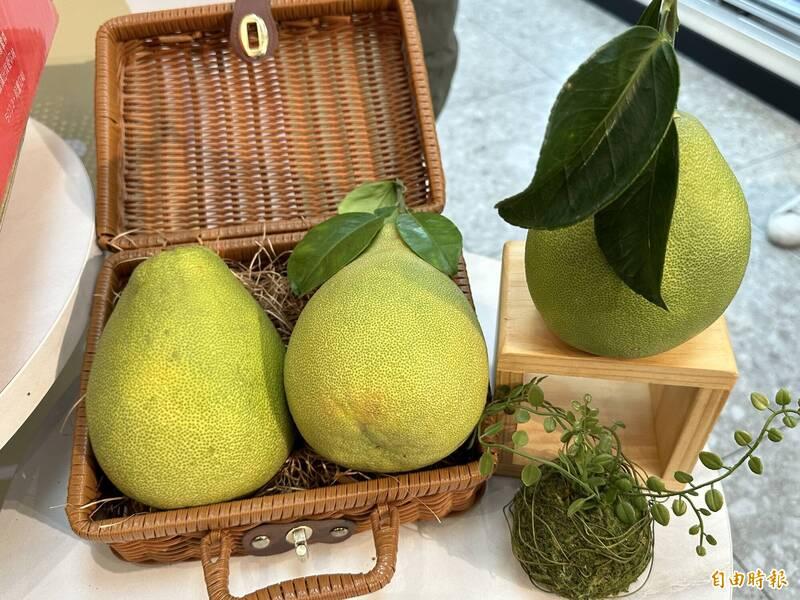After more than two years, China has lifted a ban on the import of Taiwanese pomelos in time for this year’s Mid-Autumn Festival, the Bureau of Animal and Plant Health Inspection and Quarantine said today.
China has temporarily halted the import of Taiwanese citrus fruits since Aug. 3, 2022, including pomelo.
However, China has since April hinted that fruit exports could restart soon.

Photo: Yang Yuan-ting, Taipei Times
The bureau today said that it received notice through the Cross-Strait Agreement on Cooperation of Agricultural Product Quarantine and Inspection (海峽兩岸農產品檢疫檢驗合作協議) that China would restart the import of pomelos.
Taiwan and China are to celebrate the Mid-Autumn Festival in two weeks.
As of now, no manufacturers have offered to export to China as the notice was just received today, the Ministry of Agriculture said.
As of the end of last month, Taiwan’s pomelo exports reached 1,464 tonnes.
The main recipients are Singapore, Hong Kong and Canada, with these exports set to continue.
Two of Taiwan’s top three producers, Tainan’s Madou District (麻豆) and Hualien County’s Rueisuei District (瑞穗), have already finished their harvest, while Yunlin County’s Douliou City (斗六) has finished 90 percent and northern regions have completed about 70 to 90 percent, the Agriculture and Food Agency said.
This year, Taiwan’s annual production yield is estimated to be 62,000 tonnes, about 20 percent lower than last year, the agency said.
However, the increased rain brought by typhoons has ensured high-quality fruit with balanced sweetness and acidity, it added.
China has also banned Taiwanese imports of largehead hairtail fish and frozen horse mackerel.
Chinese General Administration of Customs Vice Minister Zhao Zenglian (趙增連) on April 28 said the agency plans to reopen Taiwanese imports of fruits and fish that can satisfy China’s quarantine requirements on the basis of scientific assessment.

AGING: As of last month, people aged 65 or older accounted for 20.06 percent of the total population and the number of couples who got married fell by 18,685 from 2024 Taiwan has surpassed South Korea as the country least willing to have children, with an annual crude birthrate of 4.62 per 1,000 people, Ministry of the Interior data showed yesterday. The nation was previously ranked the second-lowest country in terms of total fertility rate, or the average number of children a woman has in her lifetime. However, South Korea’s fertility rate began to recover from 2023, with total fertility rate rising from 0.72 and estimated to reach 0.82 to 0.85 by last year, and the crude birthrate projected at 6.7 per 1,000 people. Japan’s crude birthrate was projected to fall below six,

Conflict with Taiwan could leave China with “massive economic disruption, catastrophic military losses, significant social unrest, and devastating sanctions,” a US think tank said in a report released on Monday. The German Marshall Fund released a report titled If China Attacks Taiwan: The Consequences for China of “Minor Conflict” and “Major War” Scenarios. The report details the “massive” economic, military, social and international costs to China in the event of a minor conflict or major war with Taiwan, estimating that the Chinese People’s Liberation Army (PLA) could sustain losses of more than half of its active-duty ground forces, including 100,000 troops. Understanding Chinese

US President Donald Trump in an interview with the New York Times published on Thursday said that “it’s up to” Chinese President Xi Jinping (習近平) what China does on Taiwan, but that he would be “very unhappy” with a change in the “status quo.” “He [Xi] considers it to be a part of China, and that’s up to him what he’s going to be doing, but I’ve expressed to him that I would be very unhappy if he did that, and I don’t think he’ll do that. I hope he doesn’t do that,” Trump said. Trump made the comments in the context

SELF-DEFENSE: Tokyo has accelerated its spending goal and its defense minister said the nation needs to discuss whether it should develop nuclear-powered submarines China is ramping up objections to what it sees as Japan’s desire to acquire nuclear weapons, despite Tokyo’s longstanding renunciation of such arms, deepening another fissure in the two neighbors’ increasingly tense ties. In what appears to be a concerted effort, China’s foreign and defense ministries issued statements on Thursday condemning alleged remilitarism efforts by Tokyo. The remarks came as two of the country’s top think tanks jointly issued a 29-page report framing actions by “right-wing forces” in Japan as posing a “serious threat” to world peace. While that report did not define “right-wing forces,” the Chinese Ministry of Foreign Affairs was